
>
We are happy to announce the winners of the LASDB Awards 2025.
Congratulations !!!
LASDB Lifetime Award: Dr. Maria Leptin, Germany and Dr. Miguel Concha, Chile.
10/5/2025
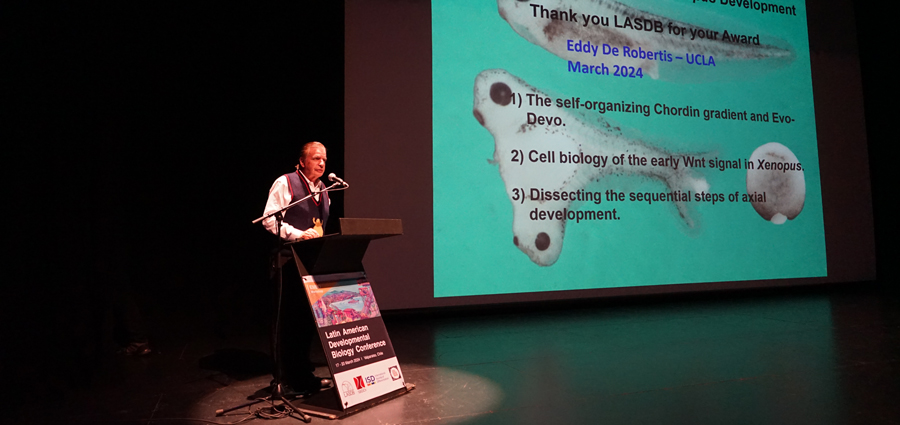
After considering the scientific achievements and outstanding contributions to developmental biology, along with the promotion of developmental biology and science in Latin America, the Prize Selection Committee arrived to the unanimous decision of awarding Eddy De Robertis with the LASDB Prize 2024.
Congratulations Eddy !!!
Outstanding developmental biologist: Eddy De Robertis is a highly influential and deserving figure in the field of developmental biology, making significant contributions to our understanding of embryonic development and molecular signaling pathways. His groundbreaking research and discoveries have had a profound impact on the field, and his work continues to inspire and guide future generations of scientists. He has made seminal contributions to our understanding of the Spemann organizer, axis formation, morphogen gradients, neural induction, among many other developmental processes.
Contribution to Latin America: Eddy has mentored numerous successful scientists, including several Latin American, many of whom have gone on to become accomplished developmental biologists, further amplifying the influence of his work. He has been involved in several Developmental Biology courses in Latin America in addition to co-authoring one of the most influential books on cell biology in the region. His dedication to teaching and mentorship has contributed to the training and development of many young scientists in Latin America, nurturing a new generation of researchers in the field of developmental biology. Furthermore, De Robertis's work has had a profound and direct impact on the scientific community in Latin America, by establishing and participating in research programs (e.g., HHMI for Latin American scientists; Latin American Fellows program for the Pew Charitable Trusts, De Robertis has participating in this Trust since its inception 30 years ago; this impactful program has facilitated the return of over 250 independent biomedical scientists to Latin America), collaborating with local scientists, and fostering international partnerships, he has helped elevate the profile of developmental biology research in the region, inspiring Latin American scientists to pursue innovative research in the field.
Contribution to the LASDB: it is likely that the LASDB would not exist if De Robertis had not supported and inspired his creation. As president of the International Society of Developmental Biology (ISDB), Eddy conceived the idea to create a scientific society that could group all developmental biologists working in Latin America, and gave practical support to the birth of LASDB.
The award was made at 11th Congress of the LASDB-2024 Valparaíso where Eddy gave a plenary lecture.
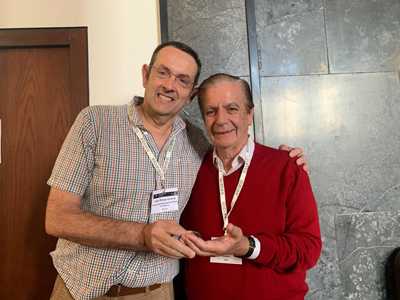

The LASDB Prize is awarded to an outstanding researcher who has made a major contribution to developmental biology, and has shown an active involvement in Latin American science.
After considering her scientific achievements, along with her strong contributions to research in Ecuador, and in general to promoting Developmental Biology in Latin America, the Prize Selection Committee arrived to the unanimous decision.
The award was made at 10th Congress of the LASDB-2019 Buenos Aires where Eugenia gave a plenary lecture.
Congratulations Eugenia !!!
Dr. Eugenia M. del Pino is an outstanding developmental biologist, whose contributions in science go beyond her research in non-model amphibian species.
As a female scientist, developing her career in the 70’s, Dr. del Pino faced many challenges, but her creativity, vision and passion resulted in developing her scientific program around the study of the marsupial frog Gastrotheca riobambae. Although it is hard to summarize her scientific contributions in a single page, some highlights include: a) The discovery of multinucleated oogenesis and of a new mode of development in amphibian species of hemiphractid frogs; and b) the introduction of new amphibian species for comparative studies of Developmental Biology. Dr. del Pino discovered extensive modularity in developmental processes that guide the blastopore closure and notochord elongation in amphibians, and its correlation with reproductive modes and ecological adaptations.
Dr. del Pino introduced the field of Developmental Biology to Ecuador and for a long time Pontificia Universidad del Ecuador (PUCE), her home institution, was the only University in Ecuador with a theoretical and practical undergraduate course in this subject, and her laboratory was the only highly productive Developmental Biology research laboratory. Her research programs were mainly driven by undergraduate students, as no graduate programs were available in Ecuador at the time. Scientific collaboration was one of her strengths. She partnered with scientist from USA, Japan, UK and Germany. She did so informally, or through programs including the Alexander Von Humboldt and Fulbright fellowships.
Dr. del Pino played a fundamental role in the advancement of science in Ecuador. She is founding member of the Ecuadorian Society of Biology and the Ecuadorian Academy of Sciences, and board member of the Charles Darwin Foundation for Galapagos Islands research and conservation. She also contributed to the advancement of Science, and Developmental Biology in Latin America as an active member of the Society of Developmental Biology and part of the founding members of the LASDB. She also served as Member of the Board of Directors of the Iberoamerican Society for Cell Biology. Furthermore, Dr. del Pino’s academic career transcended internationally, as she is the first and only Ecuadorian citizen that has been recognized as member of the National Academy of Sciences. del Pino is also member of the American Academy of Arts and Sciences, and Fellow of the Academy of Sciences for the Developing World (TWAS).
Dr. del Pino’s productive scientific career resulted in training of what is now an active generation of Latin American scientists. Dr. del Pino’s success and recognition in science results from her dedication and ability to train undergraduates in research. Her publication record is a testimony to her scientific commitment to undergraduate training, as many co-authors are her own undergraduate students. Dr. del Pino trained over 300 students through both her teaching and research. From her undergraduate trainees, at least eight of us have established our own research labs.
Roberto Mayor from the University College London was the winner of the first LASDB Prize in Developmental Biology.
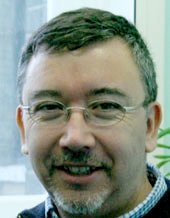
Roberto Mayor was awarded the first LASDB Prize in Developmental Biology during the 17th International congress of Developmental Biology which was held in Cancun, Mexico, June 16-20, 2013.
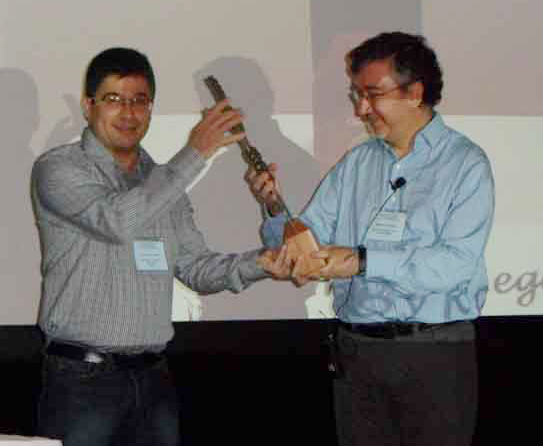
Roberto Mayor receiving the prize from the president of LASDB, José Xavier Neto.
Cancun, Mexico, June 2013.
The LASDB Prize is awarded not more than once a year to a person who has made a major contribution to developmental biology. The award is made at the LASDB meeting, where the winner will be invited to give a plenary lecture.
Nominations:
Nominees should be outstanding developmental biologists. Nominations should be sent directly to the LASDB president by the closing deadline. Nominations should consist of a short statement of support (maximum 1 page A4) from a proposer, stating why the candidate is suitable for the prize. Self-nomination is not allowed. Neither the proposer, nor the candidate needs to be LASDB members. It is desirable, but not essential, for the nominee to have shown a positive impact in Latin American science.
Prize Selection committee:
The prize selection committee will be formed by at least nine (9) and a maximum of thirteen (13) outstanding developmental biologists. It is desirable, but not essential, for the committee member to have shown an involvement with, or active interest in Latin American science. Being a member of the prize selection committee is incompatible with being nominated as a candidate for the prize. If a member of the committee is nominated he/she should choose between staying in the committee and renounce as candidate, or resign to the committee.
The LASDB president will chair the prize selection committee. For the first award the LASDB president will receive suggestions for the prize selection committee from LASDB members and will propose a prize selection committee to the LASDB board. The committee will last 4 years.
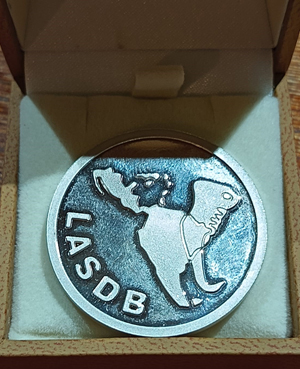
We are happy to announce the reestablishment the LASDB Prize that is to be awarded to outstanding developmental biologists, which might have shown (desirable but not essential) an involvement or active interest in Latin American science. The Prize has been awarded only once by our Society to Roberto Mayor in 2013 and it is now our intention to reestablish the prize and select an awardee on a regular basis every two years.
Any of you can nominate a candidate. Nominations should be sent directly to the LASDB president (Email address: pwappner@leloir.org.ar) by the closing deadline on November 15. Nominations should consist of a short statement of support (maximum 1 page A4) from the proposer, stating why the candidate is suitable for the prize. Self-nomination is not allowed. Neither the proposer, nor the candidate need to be LASDB members. The Committee will select the awardee by December 15.
The LASDB Prize Selection Committee is formed by Eric Wieschaus, Marianne Bronner, Angela Nieto, Alfonso Martinez Arias, Eddy de Robertis, Ruth Lehmann, Maria Leptin, Claudio Stern, Alejandro Sanchez Alvarado, Guillermo Oliver, Roberto Mayor and Pablo Wappner.
Thanking in advance and looking forward for nominations.
We are happy to announce that nominations for the LASDB Prize are now open.
The LASDB Prize is awarded to a scientist who has made a major contribution to developmental biology. The award will be made at the LASDB meeting 2024, where the winner will be invited to give a plenary lecture.
Nominations:
Nominees should be outstanding developmental biologists. Nominations should consist of a short statement of support (maximum 1 page A4), stating why the candidate is suitable for the prize. Self-nomination is not allowed. Neither the proposer, nor the candidate need to be LASDB members. It is desirable, but not essential, for the nominee to have shown an involvement, or active interest in Latin American science.
Nominations should be sent directly to Juan Riesgo-Escovar, LASDB president (Email address: riesgo@unam.mx). Please cc to LASDB email: lasdb.development@gmail.com.
Deadline is July 31, 2023.
Thanking in advance and looking forward to receiving nominations.

We are happy to announce that nominations for the LASDB Prize 2025 are now open.
The LASDB Prize is awarded to a scientist who has made a major contribution to developmental biology. The award will be made at the LASDB-ISDB-SDB joint meeting in Puerto Rico in June 2025, where the winner will be invited to give a plenary lecture.
Nominations:
Nominees should be outstanding developmental biologists. Nominations should consist of a short statement of support (maximum 1 page A4), stating why the candidate is suitable for the prize. Self-nomination is not allowed. Neither the proposer, nor the candidate need to be LASDB members. It is desirable, but not essential, for the nominee to have shown an involvement, or active interest in Latin American science.
Nominations should be sent directly to Juan Riesgo-Escovar, riesgo@unam.mx. Please cc to LASDB email: lasdb.development@gmail.com.
Deadline EXTENDED: March 9, 2025.
Thanking in advance and looking forward to receiving nominations.
Mapping Latin American Developmental Biologists
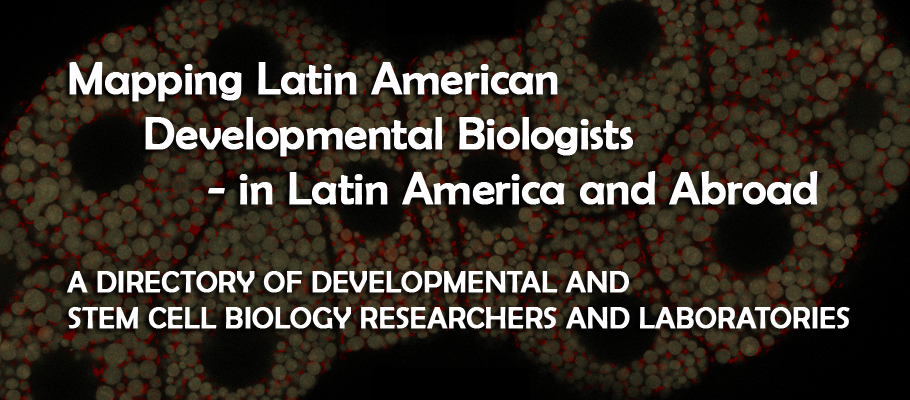
Complete your profile and Join the Directory of Latin American Developmental Biologists!
ANNUAL MEMBERSHIP
The budget of the Society depends on the timely payment of the fees.POSITIONS
UNIVERSIDAD DE PUERTO RICO - Tenure Track Faculty Position - DEVELOPMENTAL BIOLOGY.
Applying a multidisciplinary approach to uncover the mechanisms underpinning successful regeneration of the spinal cord after injury. The University of Manchester. Division of Developmental Biology and Medicine.
Co-supervised by Karel Dorey, Raman Das and Osvaldo Chara
Job Opening Universidad de Valparaiso. Assistant Professor in Genetics and Development of the Nervous System
See Job Opportunities at The Node.